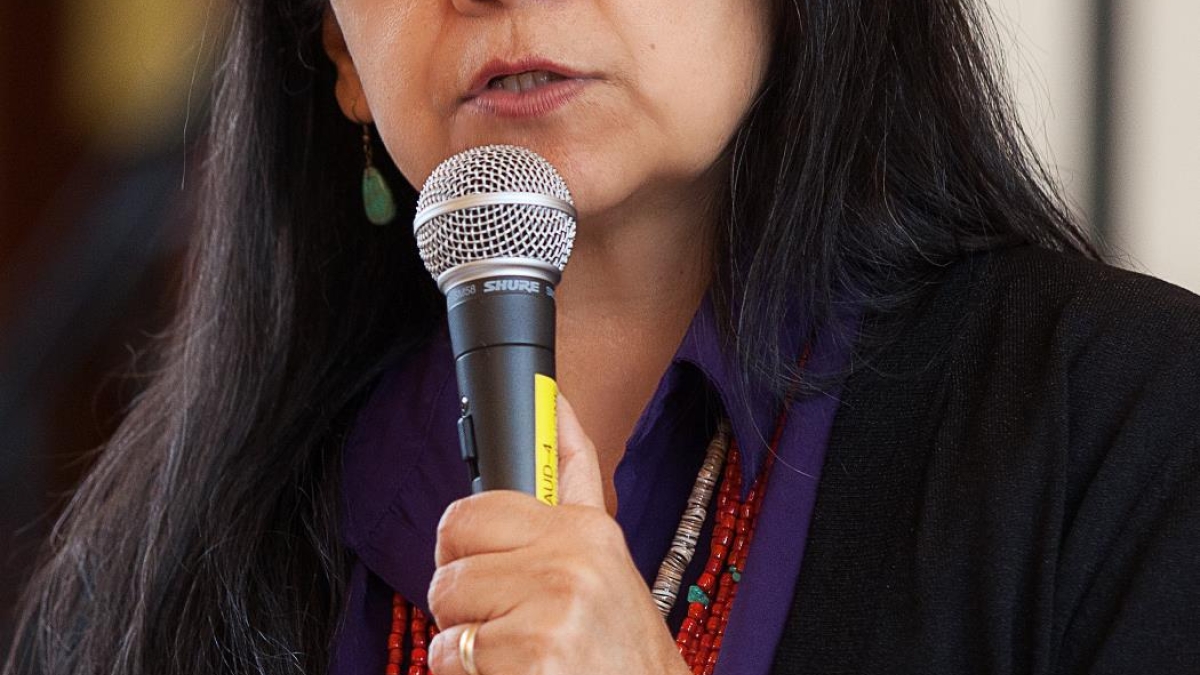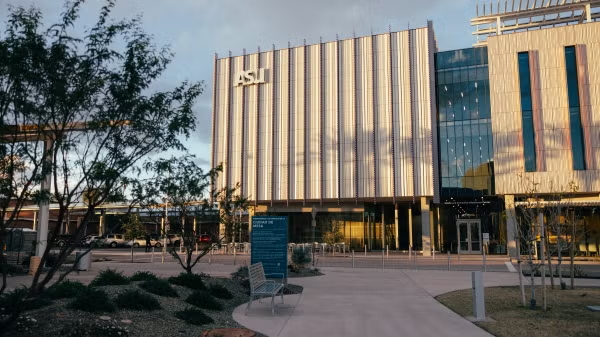Children’s literature activist to speak at ASU indigenous lecture

“What I'm doing isn't for me and my well-being,” says scholar and critic Debbie Reese about her work dispelling literary stereotypes of Indigenous people. “It is for the children, Native and not, who will read those books.” Reese will give an ASU-sponsored lecture on Oct. 20 at the Heard Museum in Phoenix.
For Debbie Reese, cutting classes in high school was an opportunity to indulge her passions. Rather than finding trouble, however, she used that time to volunteer at Head Start, a program dedicated to helping impoverished youth.
The Illinois-based educator has always been drawn to helping others, especially kids, which was inspired by her upbringing.
“I remember that as a child growing up at Nambé Pueblo, our elders taught us that the things we do are not for us as individuals, but for our community.”
Reese has incorporated those values into her life’s work as a scholar and activist. She is the publisher of the blog American Indians in Children’s Literature (AICL), which provides critical perspectives and analysis of Indigenous peoples in children’s and young adult books, school curricula, popular culture and society.
“What I'm doing isn't for me and my well-being,” she said. “It is for the children, Native and not, who will read those books.”
Reese will speak about the work of dispelling misconceptions in her presentation “Some Truths, but Lots of Lies: Indigenous Peoples in Children’s Literature” in the fall 2016 Simon Ortiz and Labriola Center Lecture on Indigenous Land, Culture, and Community. The ASU-sponsored lecture will take at 7 p.m. Oct. 20 at the Heard Museum in Phoenix. An on-campus, meet-and-greet reception with Reese will take place at the Labriola Center in Hayden Library also that day at 10:30 a.m.
In public and for the public
Since its beginning in 2006, AICL has been a heavy influence on authors and readers alike — sometimes even prompting authors to make revisions to their work.
“A good example is Ashley Hope Perez's ‘Out of Darkness,’” Reese said. “It isn't about Native people, but it did have a character saying he was the ‘low man on the totem pole.’ That is one of those common phrases people use that embodies lack of knowledge of the Native peoples who create and use totem poles. I wrote to her, and she edited that passage out of her book. It does not appear in the second printing.”
Reese shares that this immediate impact is precisely the reason she does public-facing work.
“I launched my blog with the goal of making my research accessible to anyone who had access to the Internet,” she said. “Most scholars publish in journals and books that teachers, parents, and librarians never see or can't afford.”
It wasn’t until pursuing her doctorate at the University of Illinois that Reese became aware of the extent of the misrepresentation of Native peoples. To her amazement, she found an overarching ignorance of American indigenous culture outside of indigenous communities, even at the university level.
Reese remarks that her acknowledgment of her Nambé heritage at school, “led to people asking or inviting me to dance at their gatherings. I was surprised by that and realized how deeply they were miseducated by the university's stereotypical Indian mascot, ‘Chief Illiniwek.’”
Starting at the beginning
When she also struggled to find books with accurate portrayals of Native culture to read to her own young daughter, Reese decided to change her focus of study from family literacy to depictions of Native peoples in children’s texts. Reese had come to understand that she could help address the rampant misconceptions with young children, long before they reached university.
“I started looking critically and found images like that of the mascot in much-loved books: dearly-loved characters, like Clifford the Big Red Dog, [who] wears a headdress in one of Norman Bridwell's books,” Reese said. “My research found that children were far more likely to see that sort of thing in their books than stories and images that accurately portray us.”
With a refocused passion, Reese became a vocal leader while at the University of Illinois; she helped establish the Native American House and an American Indian studies program at the university.
Reese has amassed a plethora of awards and achievements. She regularly travels around the country to speak publicly about Native American culture and representation. As a touchstone, she points to a widely cited concept discussed by Rudine Sims Bishop in the 1990s — that books can function as “mirrors, windows and sliding glass doors,” validating and reflecting children’s lived experiences. Reese’s motivation is to create more opportunities for accurate reflections of, and for, American Indians.
“We need those mirrors for Native children,” Reese said, “and we need more people in our communities and university settings to speak up about those distorted mirrors.”
The Simon Ortiz and Labriola Center Lecture on Indigenous Land, Culture, and Community at Arizona State University addresses topics and issues across disciplines in the arts, humanities, sciences, and politics. Underscoring Indigenous American experiences and perspectives, this series seeks to create and celebrate knowledge that evolves from an inclusive Indigenous worldview and that is applicable to all walks of life. Simon Ortiz, a poet of Acoma Pueblo heritage and the series namesake and organizer, is a Regents’ Professor of English and American Indian studies at ASU.
ASU sponsors include the American Indian Policy Institute; American Indian Studies Program; Department of English; School of Historical, Philosophical, and Religious Studies (all units in the College of Liberal Arts and Sciences); the Indian Legal Program in the Sandra Day O'Connor College of Law; Labriola National American Indian Data Center and ASU Libraries; School of Art in the Herberger Institute for Design and the Arts; and Women and Gender Studies in the School of Social Transformation. The Heard Museum is a community partner.
More information about the Indigenous Lecture Series is available on its website.
Written by Josh Morris
More Arts, humanities and education

Award-winning playwright shares her scriptwriting process with ASU students
Actions speak louder than words. That’s why award-winning playwright Y York is workshopping her latest play, "Becoming…

Exceeding great expectations in downtown Mesa
Anyone visiting downtown Mesa over the past couple of years has a lot to rave about: The bevy of restaurants, unique local shops…

Upcoming exhibition brings experimental art and more to the West Valley campus
Ask Tra Bouscaren how he got into art and his answer is simple.“Art saved my life when I was 19,” he says. “I was in a…

